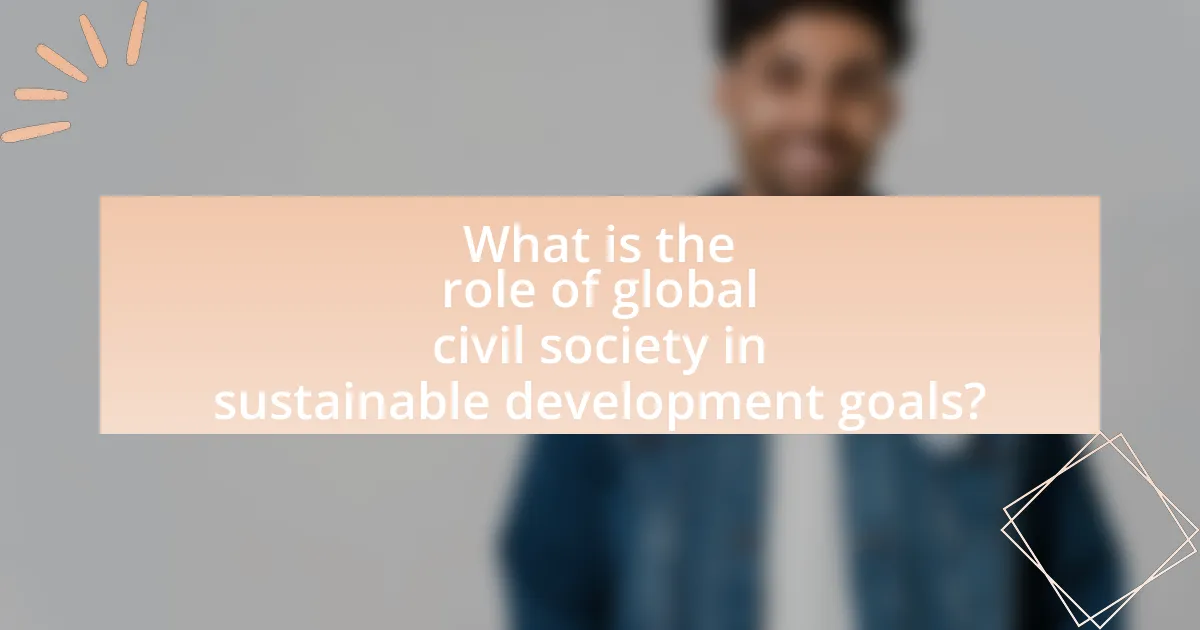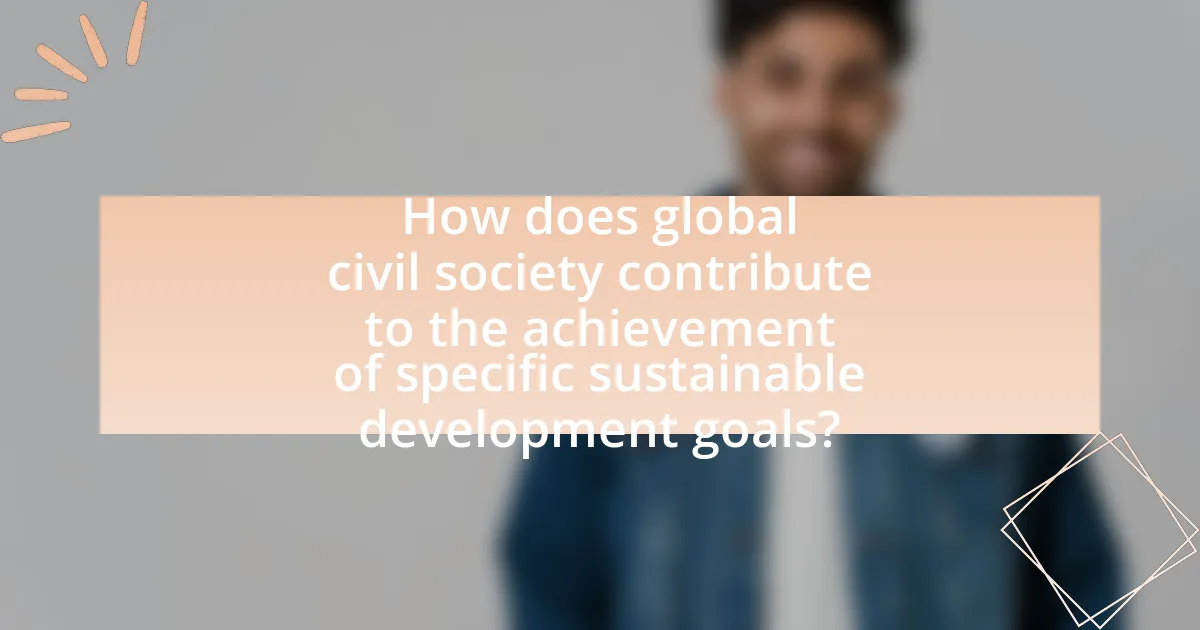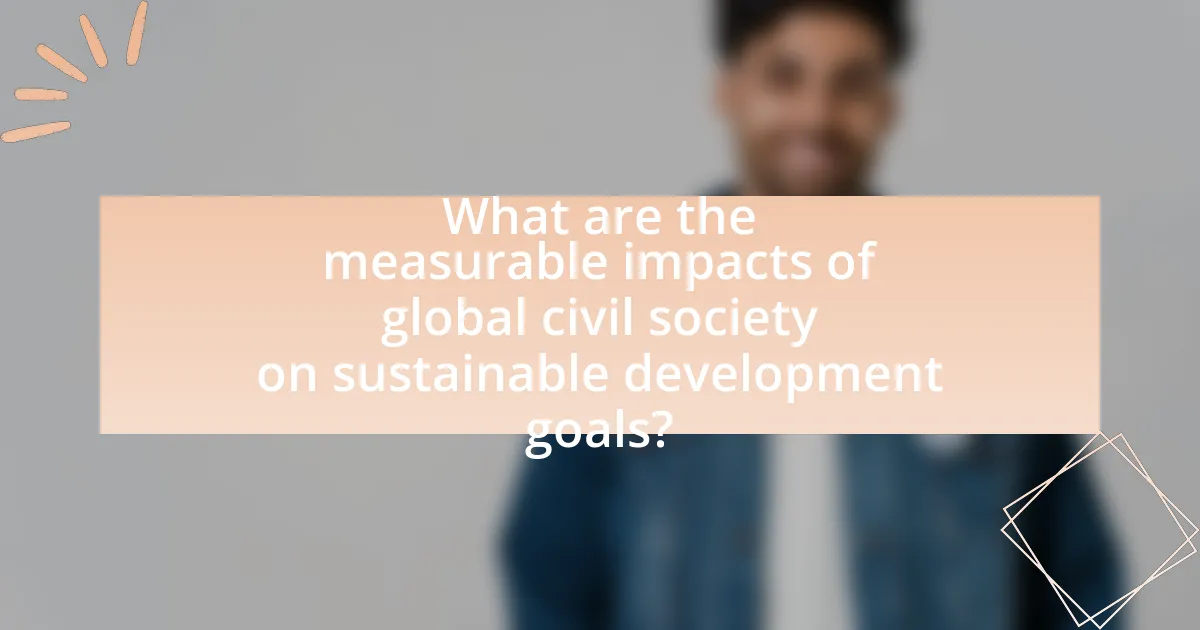Global civil society plays a vital role in advancing sustainable development goals (SDGs) by advocating for policy changes, mobilizing resources, and fostering community engagement. Key organizations, including NGOs and grassroots movements, influence policy-making, hold governments accountable, and ensure marginalized voices are included in decision-making processes. The article examines the challenges faced by global civil society, such as funding limitations and political resistance, while highlighting successful collaborations with governments and the private sector. It also explores the measurable impacts of civil society initiatives on specific SDGs, innovative approaches, and best practices that enhance their effectiveness in promoting sustainable development.

What is the role of global civil society in sustainable development goals?
Global civil society plays a crucial role in advancing sustainable development goals (SDGs) by advocating for policy changes, mobilizing resources, and fostering community engagement. Organizations within global civil society, such as non-governmental organizations (NGOs) and grassroots movements, contribute to the implementation of SDGs by raising awareness, holding governments accountable, and ensuring that marginalized voices are included in decision-making processes. For instance, the Global Goals campaign, which involves various civil society organizations, has successfully increased public awareness and engagement around the SDGs, demonstrating the effectiveness of civil society in promoting sustainable development initiatives.
How does global civil society influence policy-making for sustainable development?
Global civil society influences policy-making for sustainable development by advocating for inclusive policies, mobilizing public opinion, and holding governments accountable. Organizations such as non-governmental organizations (NGOs) and grassroots movements engage in lobbying efforts, provide expert knowledge, and facilitate dialogue among stakeholders. For instance, the World Wildlife Fund and Greenpeace have successfully influenced international agreements like the Paris Agreement by raising awareness about climate change and promoting sustainable practices. Their campaigns often lead to increased public pressure on policymakers, resulting in more robust environmental regulations and commitments to sustainable development goals.
What are the key organizations involved in global civil society?
Key organizations involved in global civil society include the United Nations (UN), World Wildlife Fund (WWF), Amnesty International, Oxfam, and Human Rights Watch. These organizations play significant roles in advocating for human rights, environmental sustainability, and social justice, contributing to the global discourse on sustainable development. For instance, the UN facilitates international cooperation and sets the framework for the Sustainable Development Goals (SDGs), while organizations like Amnesty International and Human Rights Watch focus on monitoring and promoting human rights worldwide. Oxfam addresses poverty and inequality, and WWF works towards environmental conservation, both of which are critical components of sustainable development efforts.
How do these organizations collaborate with governments and international bodies?
Organizations collaborate with governments and international bodies through partnerships, advocacy, and policy development. These collaborations often involve joint initiatives aimed at achieving Sustainable Development Goals (SDGs), where organizations provide expertise, resources, and grassroots insights that inform government policies. For instance, the United Nations often engages with non-governmental organizations (NGOs) to gather data and feedback on local needs, which helps shape international frameworks and agreements. Additionally, organizations may participate in multi-stakeholder dialogues, such as the High-Level Political Forum on Sustainable Development, to influence decision-making processes and ensure that civil society perspectives are included in governmental agendas.
What challenges does global civil society face in promoting sustainable development goals?
Global civil society faces significant challenges in promoting sustainable development goals, primarily due to limited funding, political resistance, and fragmentation within the sector. Limited funding restricts the capacity of civil society organizations to implement and sustain initiatives, as many rely on external donations and grants that can be inconsistent. Political resistance often manifests in restrictive regulations and policies that hinder the operational freedom of these organizations, particularly in authoritarian regimes where dissent is not tolerated. Fragmentation within global civil society leads to a lack of coordination and unified strategy, which diminishes the overall impact of efforts to achieve sustainable development goals. According to a report by the United Nations Development Programme, these challenges collectively impede the effectiveness of civil society in influencing policy and mobilizing communities towards sustainable development.
How do funding limitations affect the effectiveness of civil society organizations?
Funding limitations significantly reduce the effectiveness of civil society organizations by constraining their operational capacity and limiting program implementation. When civil society organizations face financial constraints, they often struggle to maintain staff, leading to decreased expertise and reduced outreach efforts. For instance, a study by the International Center for Not-for-Profit Law found that organizations with limited funding reported a 40% decrease in project delivery and community engagement activities. Additionally, funding limitations can hinder the ability to innovate and adapt to changing social needs, ultimately impacting their contribution to sustainable development goals.
What barriers exist in engaging local communities in sustainable development initiatives?
Barriers in engaging local communities in sustainable development initiatives include lack of awareness, insufficient resources, and cultural differences. Lack of awareness often stems from inadequate communication about the benefits and importance of sustainable practices, which can lead to community apathy. Insufficient resources, including financial constraints and limited access to technology, hinder the ability of communities to participate effectively. Cultural differences can create misunderstandings or resistance to initiatives perceived as foreign or misaligned with local values. These barriers are documented in studies such as the United Nations Development Programme’s report on community engagement, which highlights the critical need for tailored approaches to overcome these challenges.

How does global civil society contribute to the achievement of specific sustainable development goals?
Global civil society contributes to the achievement of specific sustainable development goals (SDGs) by mobilizing resources, advocating for policy changes, and fostering community engagement. Organizations within global civil society, such as non-governmental organizations (NGOs) and grassroots movements, play a crucial role in raising awareness about issues related to poverty, education, health, and environmental sustainability, directly aligning with SDGs like Goal 1 (No Poverty) and Goal 4 (Quality Education). For instance, the Global Fund for Education has successfully advocated for increased funding and policy reforms in various countries, resulting in improved access to education for millions of children. Additionally, civil society groups often serve as watchdogs, holding governments accountable for their commitments to the SDGs, thereby ensuring transparency and fostering public participation in the development process.
What strategies do civil society organizations use to address poverty and inequality?
Civil society organizations employ various strategies to address poverty and inequality, including advocacy, community empowerment, and service delivery. Advocacy efforts focus on influencing policy changes and raising awareness about systemic issues contributing to poverty, such as lack of access to education and healthcare. Community empowerment initiatives aim to build local capacities, enabling marginalized groups to participate in decision-making processes and access resources. Service delivery involves providing essential services, such as food, healthcare, and education, directly to those in need. For instance, organizations like Oxfam and Save the Children implement programs that not only provide immediate relief but also promote long-term development goals, aligning with the Sustainable Development Goals to eradicate poverty and reduce inequality.
How do grassroots movements impact local implementation of sustainable development goals?
Grassroots movements significantly enhance the local implementation of sustainable development goals (SDGs) by mobilizing community engagement and fostering accountability. These movements often arise from local needs and priorities, ensuring that the SDGs are tailored to specific contexts. For instance, grassroots organizations have been instrumental in advocating for environmental justice, leading to local policies that align with SDG 13 on climate action. Research indicates that communities involved in grassroots initiatives are more likely to participate in decision-making processes, which increases the effectiveness of SDG implementation. A study by the United Nations Development Programme highlights that local participation can improve project outcomes by up to 30%, demonstrating the tangible impact of grassroots efforts on achieving sustainable development objectives.
What role does advocacy play in promoting gender equality within sustainable development?
Advocacy plays a crucial role in promoting gender equality within sustainable development by raising awareness, influencing policy, and mobilizing resources. Through targeted campaigns and grassroots movements, advocacy groups highlight the disparities faced by women and marginalized genders, thereby pressuring governments and organizations to implement gender-sensitive policies. For instance, the United Nations’ Sustainable Development Goals emphasize gender equality as a fundamental human right and a prerequisite for sustainable development, reflecting the impact of advocacy efforts. Additionally, research shows that countries with strong advocacy movements for gender equality tend to have better outcomes in health, education, and economic participation for women, demonstrating the effectiveness of advocacy in driving systemic change.
How does global civil society engage with the private sector for sustainable development?
Global civil society engages with the private sector for sustainable development through partnerships, advocacy, and collaborative initiatives. These interactions often involve non-governmental organizations (NGOs) and community groups working alongside businesses to promote sustainable practices, share resources, and influence corporate social responsibility policies. For instance, initiatives like the UN Global Compact encourage companies to adopt sustainable and socially responsible policies, demonstrating the effectiveness of civil society’s role in shaping private sector behavior. Additionally, research shows that collaborative efforts between civil society and businesses can lead to innovative solutions for environmental and social challenges, thereby advancing the Sustainable Development Goals (SDGs).
What partnerships have proven successful in advancing sustainable practices?
Successful partnerships that have advanced sustainable practices include the collaboration between the United Nations and various non-governmental organizations (NGOs), such as the World Wildlife Fund (WWF) and Oxfam. These partnerships have facilitated initiatives like the Sustainable Development Goals (SDGs), which aim to address global challenges such as poverty, inequality, and climate change. For instance, the WWF’s partnership with the UN has led to significant conservation efforts, including the protection of endangered species and habitats, demonstrating measurable impacts on biodiversity. Additionally, Oxfam’s collaboration with local communities has resulted in sustainable agricultural practices that improve food security and livelihoods, showcasing the effectiveness of civil society in achieving sustainable development outcomes.
How do corporate social responsibility initiatives align with civil society efforts?
Corporate social responsibility (CSR) initiatives align with civil society efforts by promoting sustainable practices that address social, environmental, and economic challenges. CSR programs often focus on community engagement, ethical labor practices, and environmental stewardship, which resonate with the goals of civil society organizations that advocate for social justice, environmental protection, and community development. For instance, a study by the United Nations Global Compact found that companies implementing CSR strategies contribute to achieving the Sustainable Development Goals (SDGs) by fostering partnerships with civil society to tackle issues like poverty and inequality. This collaboration enhances the effectiveness of both corporate initiatives and civil society efforts, creating a synergistic impact on sustainable development.

What are the measurable impacts of global civil society on sustainable development goals?
Global civil society significantly influences sustainable development goals (SDGs) through advocacy, mobilization, and accountability mechanisms. For instance, organizations like Oxfam and Greenpeace have successfully lobbied for policy changes that align with SDGs, such as poverty reduction and climate action. According to a 2020 report by the United Nations, civil society organizations contributed to the implementation of SDG 16 (Peace, Justice, and Strong Institutions) by promoting transparency and participation in governance, leading to measurable improvements in local governance indices in various countries. Furthermore, the Global Partnership for Sustainable Development Data highlights that civil society’s role in data collection and dissemination has enhanced the monitoring of SDG progress, ensuring that marginalized voices are included in the development process. These examples illustrate the concrete and measurable impacts of global civil society on advancing sustainable development goals.
How can we assess the effectiveness of civil society initiatives in achieving these goals?
To assess the effectiveness of civil society initiatives in achieving Sustainable Development Goals (SDGs), one can utilize a combination of quantitative and qualitative evaluation methods. Quantitative metrics may include tracking specific indicators related to the SDGs, such as the number of beneficiaries reached, resources mobilized, or policy changes influenced by these initiatives. For instance, the United Nations Development Programme (UNDP) provides frameworks for measuring progress on SDGs, which can be employed to evaluate civil society contributions.
Qualitative assessments can involve stakeholder interviews, case studies, and participatory evaluations that capture the experiences and perceptions of those impacted by civil society initiatives. Research conducted by the Global Civil Society Index highlights the importance of community engagement and feedback in evaluating the effectiveness of these initiatives. By triangulating data from both quantitative and qualitative sources, a comprehensive understanding of the impact of civil society on SDGs can be achieved.
What metrics are used to evaluate the success of civil society contributions?
Metrics used to evaluate the success of civil society contributions include quantitative indicators such as the number of initiatives launched, funding secured, and policy changes influenced. Additionally, qualitative assessments like stakeholder feedback, community engagement levels, and the sustainability of projects are crucial. For instance, the Global Partnership for Effective Development Cooperation emphasizes the importance of measuring outcomes related to poverty reduction and social inclusion, which are directly linked to civil society efforts in achieving Sustainable Development Goals.
How do case studies illustrate the impact of civil society on specific goals?
Case studies illustrate the impact of civil society on specific goals by providing concrete examples of how grassroots organizations and movements drive change in areas such as education, health, and environmental sustainability. For instance, the case study of the “Green Belt Movement” in Kenya demonstrates how civil society mobilized communities to combat deforestation and promote sustainable land use, resulting in the planting of over 51 million trees and significant improvements in local biodiversity. This initiative not only addressed environmental goals but also empowered women and improved community livelihoods, showcasing the multifaceted impact of civil society on achieving Sustainable Development Goals.
What best practices can civil society organizations adopt to enhance their impact?
Civil society organizations can enhance their impact by adopting a strategic approach that includes stakeholder engagement, evidence-based advocacy, and capacity building. Engaging stakeholders ensures that the voices of the communities they serve are heard, which leads to more relevant and effective programs. Evidence-based advocacy involves using data and research to inform policy positions and demonstrate the effectiveness of their initiatives, thereby increasing credibility and influence. Capacity building focuses on strengthening the skills and resources of both the organization and the communities, enabling them to better address challenges and sustain efforts over time. These practices are supported by studies indicating that organizations employing stakeholder engagement and data-driven strategies achieve greater success in meeting their objectives and contributing to sustainable development goals.
How can civil society improve collaboration with stakeholders for better outcomes?
Civil society can improve collaboration with stakeholders for better outcomes by establishing clear communication channels and fostering inclusive participation. Effective communication ensures that all stakeholders are informed and engaged, which enhances trust and cooperation. For instance, initiatives like multi-stakeholder dialogues have been shown to facilitate shared understanding and collective action, as evidenced by the United Nations’ Sustainable Development Goals (SDGs) framework, which emphasizes stakeholder engagement for successful implementation. Additionally, civil society organizations can leverage data and evidence-based advocacy to align their goals with those of stakeholders, thereby creating synergies that lead to more impactful outcomes.
What innovative approaches have emerged in civil society efforts towards sustainable development?
Innovative approaches in civil society efforts towards sustainable development include participatory governance, community-led initiatives, and the use of technology for advocacy and education. Participatory governance empowers local communities to engage in decision-making processes, ensuring that development strategies reflect their needs and priorities. Community-led initiatives, such as local sustainability projects, have demonstrated effectiveness in addressing specific environmental and social challenges, fostering resilience and self-sufficiency. Additionally, technology, including social media and mobile applications, has enhanced advocacy efforts by facilitating information sharing, mobilizing support, and raising awareness about sustainable practices. These approaches have been validated by numerous case studies showing improved outcomes in areas like resource management and social equity.